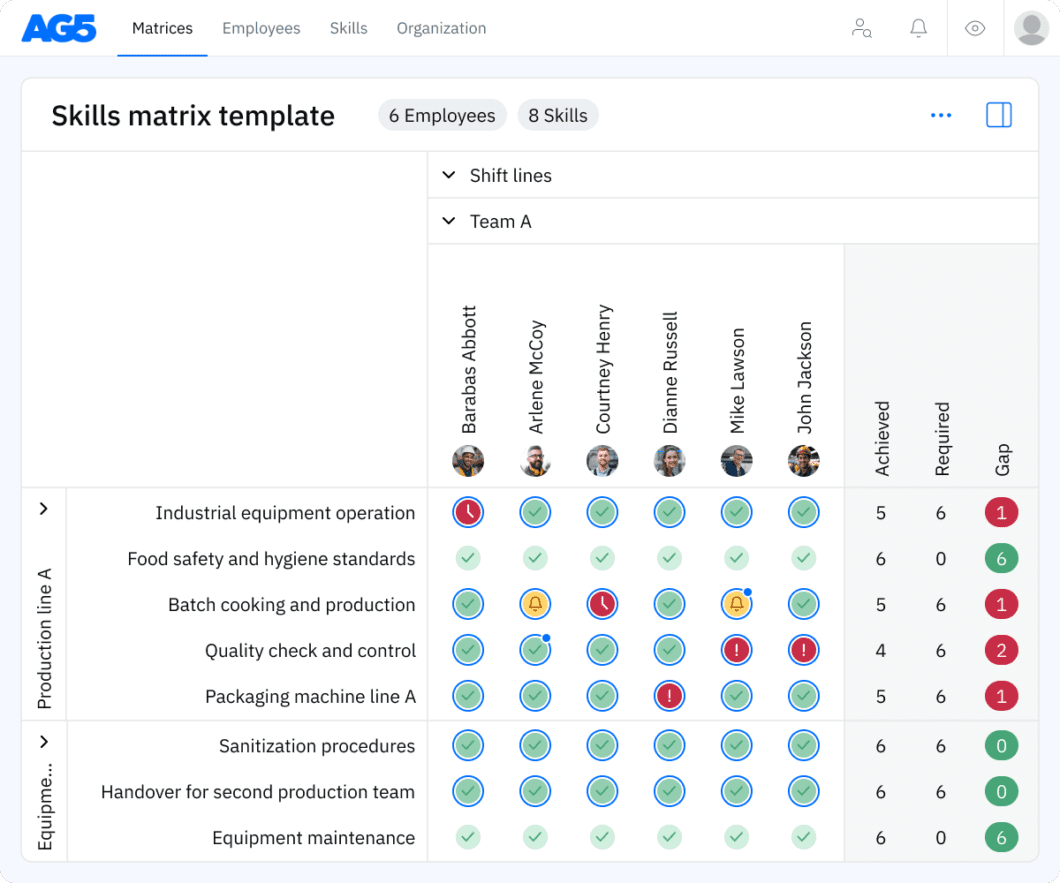Materials testing skills matrix template
A skills matrix is a tool teams can use to effectively manage and assess their materials testing skills and knowledge.
Download your free template here

Overview Copied
With our free materials testing skills matrix template, you will receive a clear overview of the skills that are present in your organization, as well as those that are missing. Using this information, you can develop and implement a plan to ensure that your employees’ skills are up to date, comprehensive, compliant, and ready for the future.
Mechanical testing
- Tensile testing
- Hardness testing (e.g., Rockwell, Brinell, Vickers)
- Compression testing
- Impact testing (e.g., Charpy, Izod)
- Fatigue testing
- Creep testing
- Fracture toughness testing
- Flexural testing
Non-destructive testing (NDT)
- Ultrasonic testing (UT)
- Radiographic testing (RT)
- Magnetic particle testing (MT)
- Liquid penetrant testing (PT)
- Eddy current testing (ECT)
- Visual testing (VT)
- Acoustic emission testing
Chemical and compositional analysis
- Spectroscopy (e.g., FTIR, UV-Vis, XRF)
- Chromatography (e.g., GC, HPLC)
- Mass spectrometry (e.g., ICP-MS)
- pH and conductivity testing
- Corrosion testing
- Chemical composition analysis
Environmental testing
- Temperature and humidity testing
- Thermal cycling and shock testing
- Salt spray testing
- Weathering and UV exposure testing
- Altitude and pressure testing
Metallurgical and microstructural testing
- Optical microscopy
- Scanning electron microscopy (SEM)
- X-ray diffraction (XRD)
- Metallography sample preparation
- Grain size analysis
- Phase identification
Standards and compliance
- Knowledge of ASTM, ISO, and other relevant testing standards
- Adherence to material testing regulations
- Calibration and verification of testing equipment
- Compliance with safety and environmental regulations
- Documentation and reporting according to industry standards
Data analysis and reporting
- Data interpretation and analysis
- Use of software for testing data processing (e.g., LabView, MATLAB)
- Creating comprehensive test reports
- Presenting test results to stakeholders
- Statistical analysis of test data
Health, safety, and environmental compliance
- Knowledge of laboratory safety procedures
- Safe handling of hazardous materials
- Proper disposal of chemical waste
- PPE usage and safety protocols
- Compliance with OSHA, EPA, and other regulatory bodies
Benefits Copied
Skills management software is important in materials testing as it enables organizations to track and manage the skills and qualifications of employees involved in testing materials, ensuring they possess the necessary technical knowledge and proficiency to perform accurate and reliable material testing.
Download the free Excel Materials testing skills matrix template Copied
We also have a free Excel template available that you can download if you are not ready to get started with AG5. To download it, please complete this form here.
Author Copied
Revisions Copied
Tired of managing skills in Excel?
Say goodbye to Excel matrices. Start using AG5’s plug and play skill matrix software.
Recognized by G2 for Excellence in Skills Management

